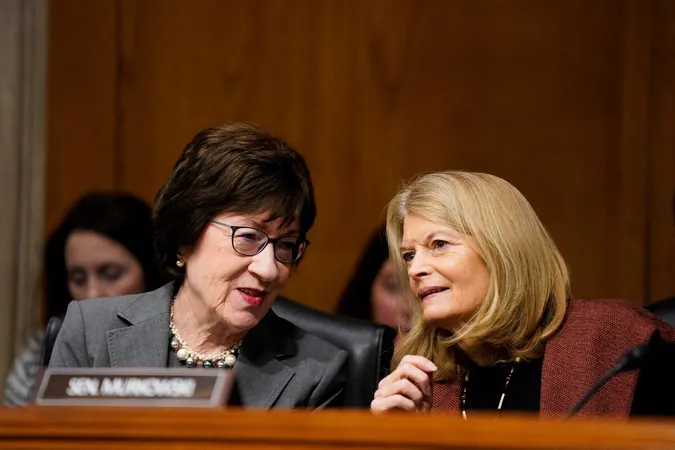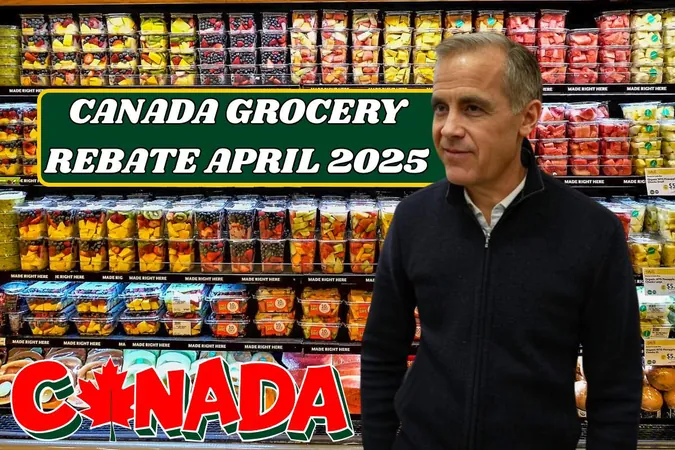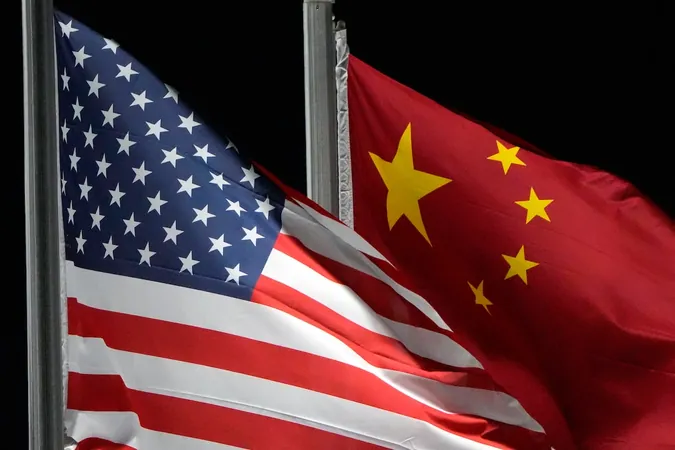
Trump Attacks Republican Senators Supporting Tariff Resolution on Canada Amid Economic Concerns
2025-04-02
Author: Jacques
Trump Criticizes GOP Senators and Tariff Resolution
In a recent episode of political turmoil, President Donald Trump unleashed harsh criticism toward GOP senators supporting a Democrat-led resolution aimed at curbing his controversial tariffs on Canadian imports. This growing discord raises questions about the future of the Republican Party and its relationship with economically important allies.
Republican Concerns over Tariffs
As fears mount among Republicans outside Washington that these sweeping tariffs could threaten their grip on power, influential party members are beginning to voice their frustrations. Notably, Texas Republican Matt Rinaldi expressed concern that if Trump continues to advocate for tariffs without careful consideration, he risks undermining the achievements of his presidency and could pave the way for a Democratic victory in upcoming elections.
Rinaldi views the tariffs as a negotiation strategy rather than a permanent fixture, intended to lower trade barriers for American goods entering Canada and beyond. "Right now, conservatives are giving Trump the benefit of the doubt, believing these tariffs are meant to exert leverage for a better free trade deal," he noted. However, the uncertainty surrounding these tariffs has many in the party on high alert.
Impact of Trump's Tariffs on States
Trump's tariffs are particularly alarming given that 31 states depend on Canada as their largest export market, with several of those states being crucial swing states that played a pivotal role in his 2016 election victory. This week alone, a bipartisan group of Republicans expressed support for the resolution, which seeks to relieve some of the customs duties imposed on Canadian products.
Trump's Social Media Response
On social media, Trump didn't hold back, chastising several Republican senators—including Mitch McConnell, Lisa Murkowski, Susan Collins, and Rand Paul—accusing them of "playing with the lives of the American people" while colluding with Democrats. The resolution's expected voting in the Senate underscores the tension between Trump's administration and party members who are voicing opposition to his trade strategy.
Rising Tensions and Economic Implications
Trade commentator Everett Eissenstat pointed out that Trump likely dislikes having his authority questioned, which may lead him to react negatively to the mounting opposition. The dissent among Republicans also highlights an increasing unease regarding the broader implications of Trump's economic policies, particularly his emphasis on taxing imported goods.
Moreover, economic forecasts suggest the impending tariffs could impose significant financial burdens on American consumers, with estimates indicating that average households could face thousands of dollars in increased costs. This potential economic strain is a point of contention for several senators, including Collins, who stated that the tariffs would adversely affect those least able to shoulder the financial burden.
Canadian Industry's Hope for Policy Shift
As the debate continues, Canadian industry leaders remain hopeful that the growing opposition within the U.S. can drive a shift in policy. Alberta Premier Danielle Smith emphasized the importance of rallying American public opinion, suggesting that collective pressure from within the U.S. could lead to a change in direction regarding tariffs.
Canadian Manufacturers & Exporters President Dennis Darby echoed this sentiment, noting that the majority of interactions between Canadian representatives and U.S. lawmakers reflected support for Canada. "We encountered no real pushback regarding Canadian trade practices," he remarked, highlighting this positive dialogue as potential leverage against the implementation of prolonged tariffs.
Conclusion: Political Drama and Economic Ramifications
In conclusion, as Trump’s tariff policies face fierce scrutiny, both Republicans and industry leaders are anxiously waiting to see how this political drama unfolds and its potential ramifications on U.S.-Canada trade relations and the future stability of the Republican Party. The ongoing situation suggests that the discussions around tariffs will remain a significant point of contention in American politics, as both parties grapple with the looming economic implications.









 Brasil (PT)
Brasil (PT)
 Canada (EN)
Canada (EN)
 Chile (ES)
Chile (ES)
 Česko (CS)
Česko (CS)
 대한민국 (KO)
대한민국 (KO)
 España (ES)
España (ES)
 France (FR)
France (FR)
 Hong Kong (EN)
Hong Kong (EN)
 Italia (IT)
Italia (IT)
 日本 (JA)
日本 (JA)
 Magyarország (HU)
Magyarország (HU)
 Norge (NO)
Norge (NO)
 Polska (PL)
Polska (PL)
 Schweiz (DE)
Schweiz (DE)
 Singapore (EN)
Singapore (EN)
 Sverige (SV)
Sverige (SV)
 Suomi (FI)
Suomi (FI)
 Türkiye (TR)
Türkiye (TR)
 الإمارات العربية المتحدة (AR)
الإمارات العربية المتحدة (AR)